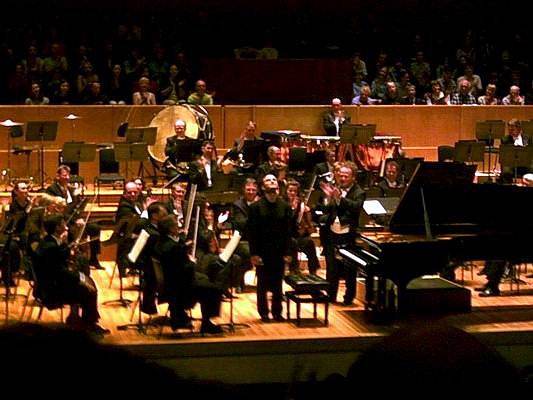S & H Concert Review
Mendelssohn, Chopin, Ravel, Debussy; Nelson Goerner (piano), London Philharmonic Orchestra; Emmanuel Krivine (conductor); RFH, 28th April, 2004, AR
The London Philharmonic Orchestra’s programme opened with a dramatic reading of Mendelssohn’s rarely played overture The Fair Melusine. Conductor Emmanuel Krivine conjured up turbulent rhythms and sombre sounds, countering any claims that this is a light-weight work. In contrast to the later offering of Claude Debussy’s La Mer, this effervescent performance perfectly captured the shifting moods of the ocean in telling the tale of a man in love with a mermaid or melusine. The LPO produced an authentic Menselssohnian sound – lush and romantic.
Maria Joao Pires withdrew from this concert; Argentinian virtuoso Nelson Goerner stepped into the breech. Goerner’s playing of Fryderyk Chopin’s Piano Concerto No.2 in F minor had a striking immediacy and intensity. He flew through this technically demanding score with seemingly effortless ease making the notes sound newly minted. Although possessed of a flawless and formidable technique, Goerner deliberately eschewed the bravura of a merely clinical, ‘technical’ brilliance. Throughout his performance Goerner kept a hawk’s eye on the orchestra who returned the complement by delivering dramatic and incisive support.
His agile yet muscular playing of the Maestoso had a fleeting and sparkling quality with his hands moving in a quick-silver blur across the keyboard, before switching to a sterner mood for the Larghetto, producing a stark tone perfectly contrasted with the LPO’s shimmering strings.
Ravel’s Le Tombeau de Couperin was given an exquisitely lithe, chamber-style interpretation by Krivine who took the work at a much quicker pace than usual. Krivine used scooping hand gestures to mould buoyant playing, particularly from the poetically pointed woodwind. The versatile LPO played the ‘Tomb of Couperin’ with the appropriate gravitas at the same time conjuring up the filigree frivolity of the rococo world. Krivine’s illuminating interpretation had magic and elegance, which is more than could be said for Debussy’s La Mer which concluded the concert. The conducting was turgid and protracted while the playing was harsh and often brutal.
From dawn to midday at sea was brashly played and coarsely textured; it lacked the sensation of sparkling light playing across the undulating surface of the sea. The strings had neither shine nor body, whilst the woodwind were frequently recessed.
The Play of the Waves glistened insufficiently, the translucent textures of light dancing on waves that Debussy orchestrated seeming removed from the performance. This was more of a stagnant pond. Again the strings lacked weight and forward thrust and the brass and percussion were louder than was ideal. Krivine’s concern for extreme dynamic range turned this subtle music into sheer noise: this was not so much the Debussy tone poem La Mer as La Merde rapidly set in concrete. How could Krivine have got the evocation of the myriad moods of the sea so right in The Fair Melusine, and then serve up this bombastic version of La Mer? This was a depressing anticlimax to an evening of otherwise magnificent music making.
Alex Russell
Further Listening
Chopin Piano Concertos 1 & 2, Martha Argerich, Montreal Symphony Orchestra, Charles Dutoit – EMI Classics: 5567982.
Debussy La Mer, Prélude à l'après-midi d'un faune, etc., Charles Munch, Boston Symphony Orchestra: RCA 61556.

 Return to:
Return to: